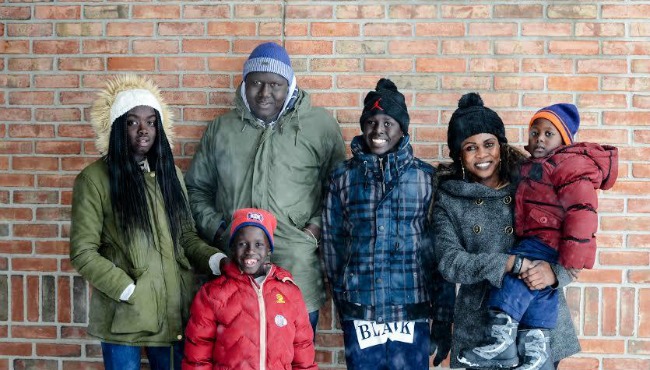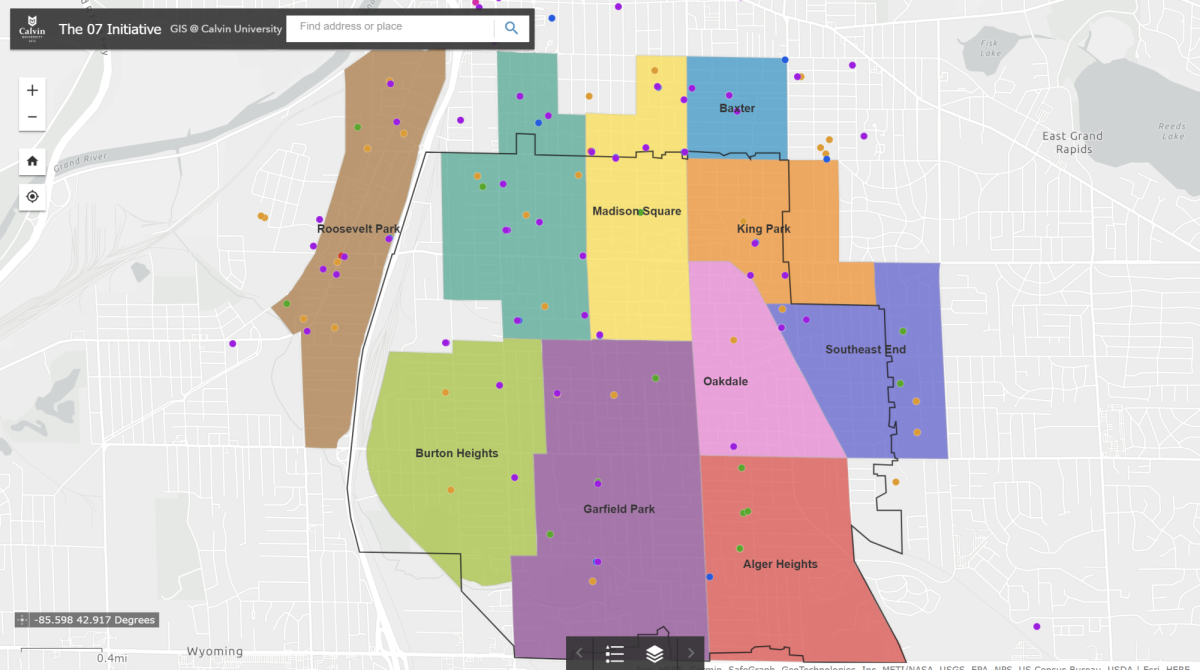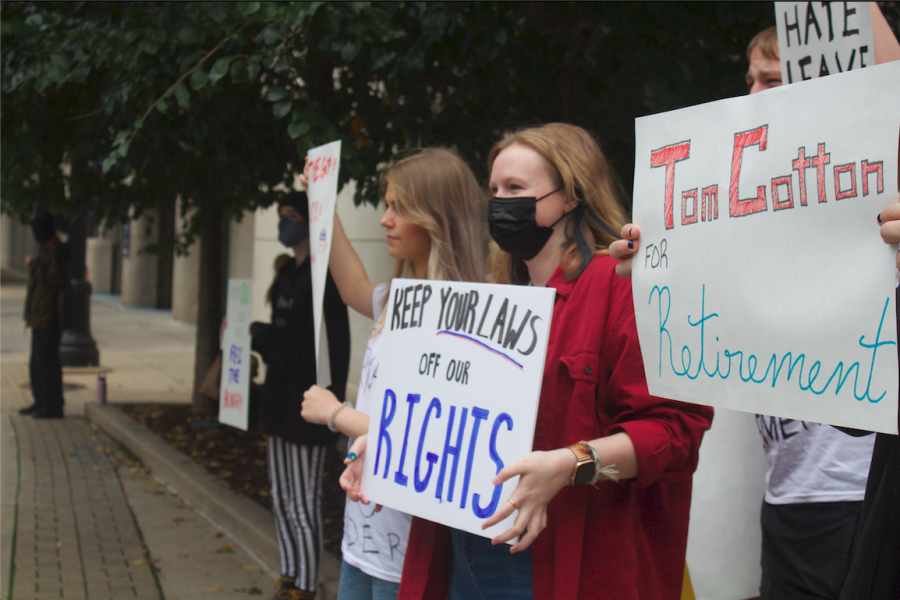In the wake of President Trump’s executive order halting all refugee entrance to the U.S. and the subsequent restraining order on the order, refugee resettlement agencies have been scrambling to continue to provide their services and advocate for those in danger around the world.
In Grand Rapids, there are three organizations who take in and support refugee families, including the local branch of Bethany Christian Services, a nonprofit that focuses on helping children and families through foster care, adoption, and refugee family reunification.
Chimes spoke with Kristine Van Noord, Bethany Christian Services’ program director for refugee resettlement in West Michigan.
Chimes: Could you describe what part Bethany plays in the refugee resettlement process?
Van Noord: Maybe it would be helpful if I just briefly explained the process. A refugee flees their first country and goes into a second country and when they are there, they register with the United Nations High Commission for Refugees (UNHCR) as a refugee and they receive that refugee status.
If it’s determined that they cannot live viably in that second country or return to their first country, then they would be considered for refugee resettlement. Less than one percent of all refugees in the world are resettled into a third country.
In the United States, that process is run by the Department of State, and the Department of State contracts with nine national resettlement agencies that welcome refugees into the US. The Department of State brings the refugees through an extremely rigorous vetting process. It involves five national agencies, like the FBI and the Department of Homeland Security, and it takes a minimum of two hundred days to go through the security clearances and medical clearances and an average of about two and a half years to go through it.
When they get towards the end of that process, they are then referred to one of those nine national agencies.
Every city has a different number of resettlement agencies. Here in Grand Rapids, for example, there are three. Bethany Christian Services is an affiliate of Church World Service. Samaritas, which is formerly Lutheran Social Services of Michigan, is an affiliate of LIRS, which is Lutheran, and EMN is Episcopalian.
Clients are first placed in cities based on if they have family or friends there. If they do not, and they are what are called free cases, then they would be placed in a city that could best meet their needs, so the cases are just kind of allocated to different cities based on if they have that language capacity or if they’re able to serve any additional needs they might have like medical issues or things like that.
Church World Service allocates cases to us, and usually about a couple weeks before they would arrive, we prepare for their arrival. We rent an apartment or a house for them […] we often engage a church or community group co-sponsor that can provide additional assistance and friendship to the family, we meet them at the airport, we help them apply for benefits, we do all different kinds of cultural orientation, help them apply for social security, get registered in school and English classes, get involved in an employment program so that they can find and maintain employment, everything that you can imagine would be necessary.
In addition to the resettlement services, we have other employment services and health programs as well.
Chimes: How many refugees does Bethany resettle in West Michigan every year?
Van Noord: Last year we resettled 366, plus an additional number of what are called Cuban entrants […] This year it was supposed to be 420.
Chimes: That’s how many were scheduled for this year?
Van Noord: Yes, what’s called “allocated.” There were 420. With our other programs like employment and health and the healing center for survivors of torture and trauma, all together we serve about 800 clients per year.
Chimes: So have there already been specific cases of refugees who were scheduled to come to Michigan who were blocked while the ban was in effect?
Van Noord: Yes, at the initial time of the executive order we had 15 clients that were scheduled for arrival. We found out on the Saturday evening after the executive order came that those scheduled prior to Feb. 3 and not from one of the included countries would be able to arrive. So we had four people that arrived last week, and then we had an additional 11 people whose flights were cancelled.
One of them is a Syrian older woman, and her case was cancelled, and then we had a Congolese family of ten that was also cancelled. Since the executive order is currently invalid, the Congolese family has been rescheduled for next week, and we are still waiting for the Syrian mother to be rescheduled.
Chimes: What has the response to the executive order been among the refugees you serve who are already in the U.S.?
Van Noord: We’ve done a lot of briefings with them so that they are very aware of what’s happening. Many of them have family members in camps, and this is for all people groups, since all refugees are impacted with the 120-day suspension of the program, and so we have talked to a lot of refugees that still have family in those refugee camps that are very concerned.
Refugee camps are often not very safe situations, and people many times have major medical needs that cannot be addressed in the camps, and so people are very concerned for their family and are wondering how long they will be delayed. Those from Syria and the other included countries are very concerned about whether or not they can get their family here.
They also are fearful for themselves and what that means for them here in the United States. They feel like the order has said that they’re not welcome here, and so even though they feel welcomed by the people of West Michigan, they’re trying to reconcile what that means for them, are they really welcome here in the United States or not.
Chimes: Could you see Bethany shifting towards more advocacy and political work if the executive order gets reinstated?
Van Noord: Well, we already have, we’ve been advocating quite a bit.
We have been sharing with those that support us, those donors, churches that we’ve worked with, employers that we’ve worked with through our refugee employment program, volunteers, we’ve been sharing with them the needs of the program and the need to advocate.
We also have sent a letter to the President and Vice President Pence and are communicating with all of our legislators and letting them know about the great need of refugees.
The reality is that the refugee program is a life-saving program, and so we are extremely concerned for the lives of refugees that are still in the camps, and it’s also a family reunification program, so it’s bringing families back together, restoring families, and that’s something that Bethany is extremely committed to. We’re very concerned about the ability to help families be restored as well.
Chimes: What gives you hope moving forward?
Van Noord: I think the outpouring of welcome from people and the desire to advocate and to volunteer and to get involved has been extremely encouraging.
We’ve heard from a lot of people that they really want the United States and Michigan in particular to continue to be a welcoming place. The U.S. has a very long history of welcoming refugees and Bethany has a long history of being a part of that. We’ve heard from a lot of people that desire that to continue, and so that’s been very encouraging and it gives me hope.









